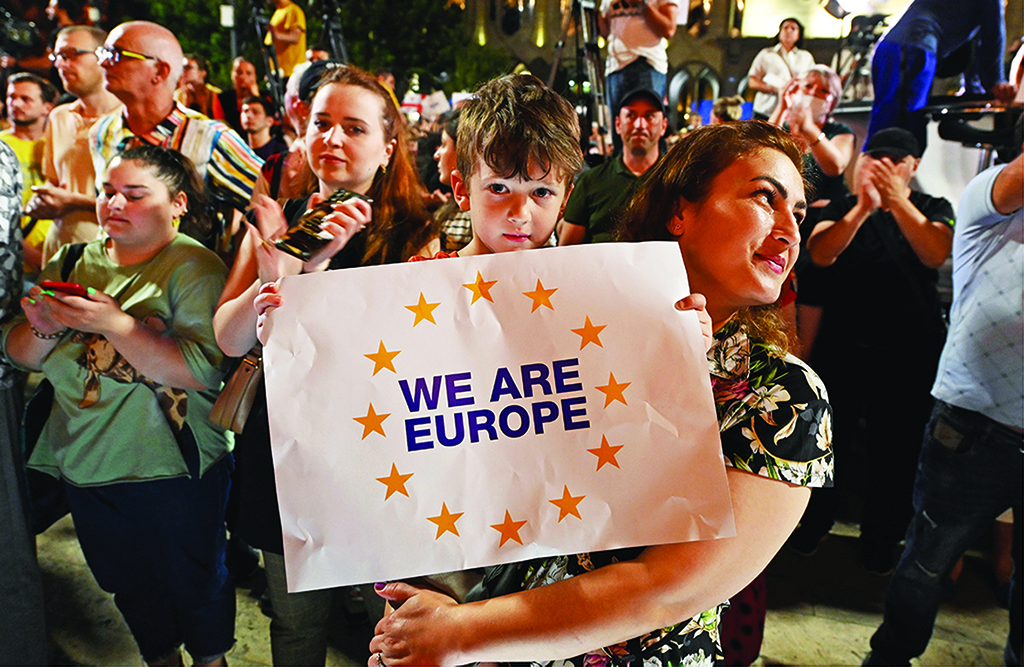TBILISI, Georgia: At least 120,000 Georgians took to the streets Monday in support of the country's EU membership bid, after the European Commission recommended deferring Tbilisi's candidacy. Waving Georgian, Ukrainian, and EU flags, demonstrators flooded on Monday evening the main throughfare of the Georgian capital Tbilisi.
In what was the biggest demonstration in decades, at least 120,000 people took part in the "March for Europe" in Tbilisi, according to an AFP estimate based on video footage shot from drones. Many held placards that read "We are Europe" as the EU anthem, the Ode to Joy, was performed at the demonstration. The rally was initiated by the Black Sea nation's leading pro-democracy groups and supported by all of the opposition parties to "demonstrate the commitment of the Georgian people to its European choice and Western values".
"Europe is a historical choice and an aspiration of Georgians, for which all generations have given sacrifices," the rally organisers said on Facebook. One of the organisers, rights activist Shota Digmelashvili, read out a manifesto announcing another rally on Friday and the launch of a "new popular movement" that will include opposition parties but will be dominated by civil activists.
"We will formulate our demands to the government and if it fails to meet them, the force of a non-violent resistance will sweep off all those who derails Georgia from its European path," he said. "Popular wrath will be directed against (the ruling party founder) oligarch Bidzina Ivanishvili" who is widely believed to be calling the shots in Georgia despite having no official political role.
'European perspective'
One of the demonstrators, 47-year-old writer Malkhaz Kharbedia, said "every Georgian must assume personal responsibility so that our European hope comes true." "We've taken to the streets today as time has come to only rely on ourselves, not anyone else, the time for our personal responsibility, effort, unshaken will, perseverance," he told AFP.
Another demonstrator, biologist Lili Nemsadze, 68, said: "Denying Georgia the status of an EU (membership) candidate will mean we are left in Russia's sphere of influence." Russian President Vladimir "Putin will interpret this as a green light to invade Georgia again."
Georgia's bid for membership of both the EU and NATO-enshrined in the country's constitution-has long angered the Kremlin and tensions culminated in Russia's invasion of Georgia in 2008. On Friday, the European Commission recommended that the European Council grant candidate status to Kyiv and Chisinau, but said it will "come back (by the end of 2022) and assess how Georgia meets the number of conditions before granting its candidate status".
The Commission also recommended granting Georgia "the European perspective," something its chief Ursula von der Leyen called a "huge step forward" on Georgia's path toward membership. "The door is wide open," she said, adding: "The sooner you deliver, the sooner there will be progress." On Monday the EU chief specified that Georgia needs to implement more reforms before it can join the bloc.
'De-oligarchisation'
Georgia's ruling Georgian Dream party has said it "regretted" that the country was not recommended as a candidate together with Ukraine and Moldova. Prime Minister Irakli Garibashvili on Friday, hailed "the historic decision to grant Georgia European perspective" and pledged to work with Brussels to "implement all the requirements and get a candidate's status."
The Georgian Dream government has faced mounting international criticism over perceived backsliding on democracy, seriously damaging Tbilisi's relations with Brussels. The European Commission said the conditions, which Tbilisi has to fulfil to be put on a formal membership path, include ending political polarisation, progress on media freedom, judiciary and electoral reforms as well as "de-oligarchisation."
Earlier this month, the European Parliament passed a non-binding resolution, calling on the EU to impose personal sanctions against Georgia's richest man Ivanishvili, for his "destructive role" in Georgia's politics and economy.
Ivanishvili insists he has retired from politics. Ukraine, Georgia, and Moldova have signed association agreements with the EU designed to bring them closer together economically and politically. The agreements also include free trade deals between the countries and the EU as well as visa-free travel for its nationals for a short stay in the Schengen area. But they give no guarantee of eventual membership. - AFP











